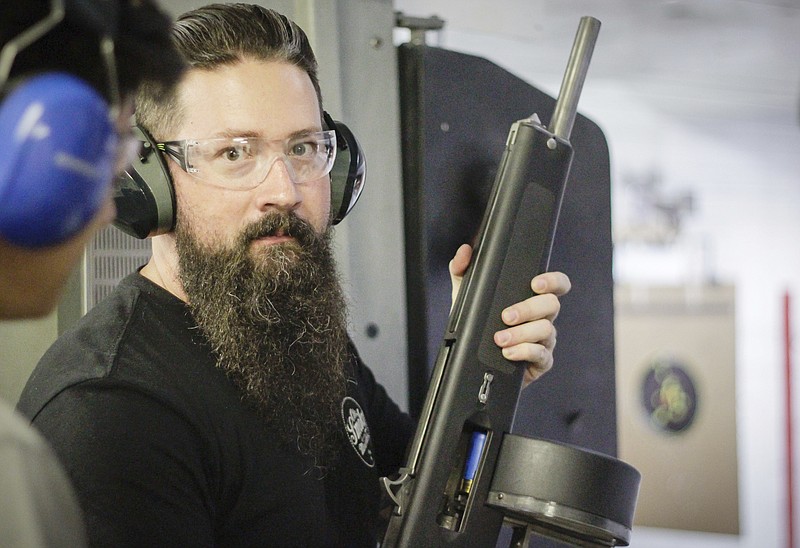NASHVILLE, Tenn. (AP) - It's a sunny Saturday morning in Bellevue as 10 women register for the required class that will allow them to get Tennessee handgun-carry permits.
Many are taking the class to be better able to protect themselves and their families. More than half of gun owners nationally say protection is a primary reason they own their weapons.
"I think most people, from an early age, have an innate notion they have a right to protect themselves," says Nashville attorney John Harris, who has taught and lectured on the use of deadly force and volunteers as executive director of the Tennessee Firearms Association. But getting from there to what is legal to do in self-defense is complicated.
What these women will not learn on this Saturday is how they can legally use their gun to protect themselves, their home or their family without the possibility of going to jail.
In fact, legal experts say, Tennessee's laws are so open to interpretation that two people engaged in identical self-defense shootings could be treated very differently by police, prosecutors and the courts.
People tend to believe they won't be charged with a crime if they shoot an intruder in their home. But that's not an automatic conclusion under state law.
Tennessee is among so-called "stand your ground states" in which people don't have to retreat before using force to defend themselves. But the law isn't simple to apply.
The state self-defense statute covers both use of force and threatened use. Self-defenders cannot themselves be engaging in illegal activities and must have a right to be where they are. They must reasonably believe that force is needed immediately for protection, they must use a proportionate amount of force and they need not retreat before using force, the statute states.
A separate provision on using deadly force states defenders also must reasonably believe there's an imminent danger of death or serious bodily injury. Again, retreat is not required.
Finally, the Tennessee statute offers additional protection for defenders who are inside their residence, business, dwelling or vehicle, and someone has unlawfully and forcibly entered it.
There are exceptions to using deadly force in the home, for example, when defenders use force against someone they knew or should have known was a law enforcement officer.
What amounts to reasonable fear of death or serious bodily harm depends on the circumstances, attorneys say.
"A subjective fear is not sufficient," says Andrew Jay McClurg, professor of law and Herff Chair of Excellence at the University of Memphis School of Law. "It has to be a 'reasonable' fear as determined by the objective external circumstances. In other words, it would not be enough that (a person) was personally in fear for his life if a 'reasonable person' would not have been."
If someone calls 911 to report they have shot someone who broke into their home, police will be involved.
They'll come to the house, talk to the person who fired the shot, talk to witnesses and gather evidence from the scene, says Knoxville Police Department Public Information Officer Darrell DeBusk. Evidence can include surveillance videos, ballistics tests and blood samples to test for impairment.
"There are so many factors on the front side of an investigation," he says, adding facts often aren't clear cut, so prosecutors can't make decisions immediately.
Police also will contact the district attorney's office during the investigation to let them know what has happened. Police conduct the investigation, and prosecutors ultimately decide whether to prosecute anyone, DeBusk says.
Cathy Gurley, chief executive officer of You Have The Power, a Nashville victims' advocacy and rights group, adds stand your ground laws "make me very cautious (because of) how fast these incidents can escalate. While you may have the best intentions, you don't really know how you are going to react when you're surprised or half-asleep.
"We look at some of the incidents even here recently, how it's going from an encounter to a death within minutes," she said. "Obviously, people have the right to own guns. What we're really concerned with is how they're used for the sake of our community and for the sake of preventing more victimizations. There are victims on either side of a shooting."
Memphis law professor McClurg urges gun owners to take self-defense training and develop a defensive shooting plan to follow in their homes.
With guns, people make the mistake of thinking "I have a gun, so now I'm safe," he said. "Where do they keep it? How long will it take to access it? These are crucial questions in self-defense."
He also says gun owners have a moral obligation - and in some circumstances, such as access by minors, a legal obligation - to store their guns safely to prevent access by unauthorized users.
___
Information from: The Nashville Ledger, http://www.nashvilleledger.com
